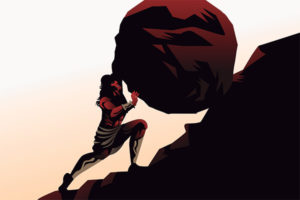 I don’t believe in thoughts and prayers. I don’t believe in tarot, Ouija or I Ching. I don’t believe in providence, fate, or luck. I don’t believe in messiahs, miracles, or silver bullets.
I don’t believe in thoughts and prayers. I don’t believe in tarot, Ouija or I Ching. I don’t believe in providence, fate, or luck. I don’t believe in messiahs, miracles, or silver bullets.
I don’t believe in progress. I don’t believe things are moving inevitably toward a better world.
I believe in people. I trust people to get things done. I believe in work.
I trust people because I don’t know what else to trust. I trust people because people create such amazing things: art, music and poetry, not to mention toilets, prosthetics, vaccines, therapies, disease-resistant crops, bridges, treaties, trade agreements, safe cars, safe planes, and laws to protect the vulnerable from the ruthless.
And yet, people mess up. Sometimes horribly.
We allow famine, war, and global warming. We create flamethrowers, bombs and assault weapons. We allow the powerful to screw the weak and laugh about it up their sleeves.
Still, I trust people to work things out. I’m hopeful.
After all, I don’t believe in “original sin.” I believe in “original blessing.” I believe we have it in us to do great things. I trust people to see what’s gone wrong, make it right, mend the world, and keep at it endlessly.
And then I remember Sisyphus.
Sisyphus was condemned by Zeus to push a giant boulder up a steep hill. He never clears the top with it. It always rolls back down to the bottom. Endlessly. It’s a myth, of course, which means it never was but always is.
Sometimes I worry that I’m Sisyphus and that trusting people is pushing my luck like a giant boulder up a steep hill.




But why not?
Living in hope and trust, if you can manage it, is the way to go. Don’t worry, be happy!
What about both/and. I worry and am happy. As Albert Camus said: We must imagine Sisyphus happy. I don’t know about “must.” But I suppose we can. And I do.
The person I have admired most in the world, Mother Teresa, said “God doesn’t ask you to succeed, he only asks you to try.”
Thanks, Betty. That is one of my favorite aphorisms as well. We just keep pushing until we can’t anymore!
“We allow famine, war, and global warming. ”
It’s surprising to hear that line from a student of Yuval Harari, whose great book Homo Deus — as you know — describes how much “we” (mankind) have done to greatly reduce war and famine.
Isn’t it a bit presumptuous to say that any of us have “allow(ed)” those phenomena, as if we have a choice? Personally I refuse to admit that I’ve “allowed” those things, in any meaningful sense of the word.
The collective “we” goes both ways. “We” get credit for many things we had no hand in creating just because we’re part of humankind. And likewise, “we” must take blame for things that go awry. I agree with Abraham Heschel’s aphorism. We are not all guilty, but we are all responsibile. He or someone else said: While the German Christians sang their Gregorian chants, the trains rolled on. I think that’s called “complicity.”
Thanks for the thoughtful and interesting posting. Rolling stones seem to be a popular focus of myths, whether you are rolling them up a hill or to open a tomb. I guess individuals and societies are inclined to knead myths into a perceived shape even if the final product comes out half baked in the long run.
Astute, my friend. “Rolling Stones” would be good name for a blog or a band, don’t you think?
Randy,
Your viewpoint offers some very sound practical guidance on how to live one’s life but I am not sure it covers the basic question that mystics, philosophers, saints, etc. have been offering insight into throughout civilization. Who are we and what is the meaning of life? It does seem to promote “humanism” and perhaps even a dose of ‘agnosticism’. I find that I need something more than just hoping that I am alive during a good cycle and “God, save me from fates worse than my own.”
Hey Michael, Not to worry: I am working on an answer to “what is the meaning of life.” Stay tuned. 🙂
Your opening lines remind me of a John Lennon song from one of his first post Beatle albums. He cites a long list of things he doesn’t believe in anymore, including The Beatles, before affirming that he is finally left with nothing except believing in himself and his wife. It finally boils down to an existential declaration. “I just believe in me; and that’s reality.” However, as you have succinctly pointed out, none of us can make this journey alone. I always felt that Sisyphus and Prometheus got a raw deal. Prometheus was chained to his rock, but Sisyphus could have walked away from his stone anytime he wanted to. Let’s face it, the gods are capricious
I definitely had that Lennon song in mind. My first draft included: I don’t believe in Lennon, Yoko, or Beatles.